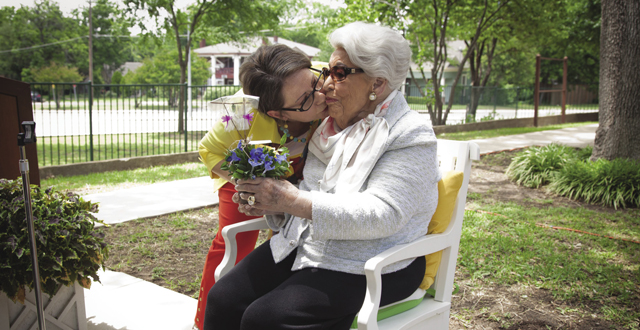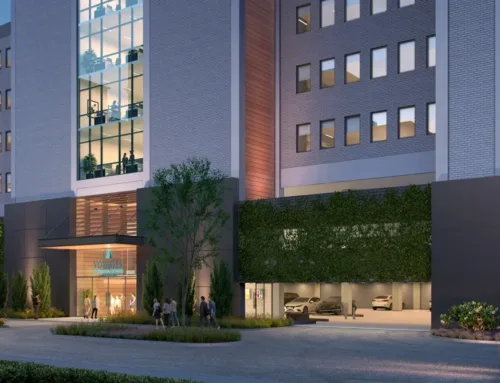
Juliette Fowler CEO Sabrina Porter gives real estate legend Ebby Halliday a kiss during the ribbon cutting ceremony for the Ebby House in May: Photo by Kim Leeson
When Sabrina Porter became the CEO of Juliette Fowler Communities in January 2012, she had high aspirations for the future of the organization.
Although Juliette Fowler Communities was founded in 1892 as a home for women and children, today it is best known for its assisted and independent living, as well as its nursing care and rehab therapy. But Porter didn’t want to focus solely on business matters. She wanted to work with the faculty and staff to revive the original vision of the organization — serving women and children.
Porter hit the ground running by immediately establishing a partnership with Big Brothers Big Sisters to provide mentorship opportunities with the residents and staff at their facility. She also struck up a partnership between Presbyterian Children’s Homes and Services to serve children and youth who need short- or long-term placement in foster care.
Just three months later, Porter presented the board with a new mission: to help young women who are aging out of the foster care system.
The statistics on life after foster care are staggeringly bleak, a fact Porter wanted to help change.
“The girls, they can’t wait to get out of foster care. Then they’re out at 18, and they’re pregnant within two years,” Porter says.
According to the Foster Care Alumni of America, 84 percent of young men and women become a parent within two to four years after leaving foster care.
Not only that, 51 percent are unemployed, 50 percent are homeless, 30 percent are receiving public assistance, and 25 percent are in prison.
“Then they’re on the street, and the babies are in the system nine months later,” Porter says. “It’s a vicious cycle. All I can think is, ‘We’ve got to do something here.’ ”
Porter witnessed this “vicious cycle” time and time again at Hope Mansion Maternity Home in Cedar Hill, a home for girls in crisis pregnancy that Porter established five years ago.
“We thought if we just had a place for them to come, then we could impact change, and maybe change that pattern and change that path,” she says.
Two years after Hope Mansion opened its doors, Porter realized something.
“We’re getting these girls reactive. We’re getting them after they’ve made these choices,” Porter explains.
“There’s a need to get to these girls and impact their lives before they make those choices that are lifetime-impacting choices.”
Porter hoped to take a different approach with Juliette Fowler Communities by establishing a residential home where a group of young women ages 18-22 could live for a year or two under the supervision of a house mom to learn basic life skills.
The intent is not to “baby or coddle them,” Porter explains. “They’re young women. We want to mold, mentor and equip them.”
Porter knows from personal experience how much impact a mentor can have on the life of a young woman.
She began working at Cantex Senior Community at 13 years old as a nurse aide and quickly became very close with the elderly people she worked with.
“The elderly people that I served, they’re beautiful people. The wisdom, the work ethic, the values, the promises made on a handshake,” she explains. “They became my family. I know what a difference they made in my life.”
As the survivor of child abuse and other childhood difficulties, Porter credits a co-worker — another nurse aide who became something of a second mother for her during her growing-up years — as the person who taught her she could “do anything she put her mind to.”
Porter stayed with the company for 15 years, cutting her teeth on business and management as she worked her way up the proverbial ladder to chief operating officer.
After a five-year career pause during which she had three children, Porter became vice president of resident relations at Presbyterian Communities and executive director at Grace Presbyterian Village at the same time. She did that until 2012, when she became the CEO of Juliette Fowler Communities.
Juliette Fowler Communities approached her to see if she would be interested in taking over when the former CEO retired. The board hoped she’d help the community restore its original mission to help children.
The idea to help young women aging out of foster care was already stewing in her mind because of her experience with Hope Mansion. She approached the board with the idea, and after months of research and meetings, the community decided to proceed.
For months Porter referred to the program as “a program for helping girls who age out of foster care,” until Dallas real estate legend Ebby Halliday got wind of the vision and decided she wanted in on the action.
“Before I knew it, we were naming it the Ebby House,” Porter says. “She was thrilled to be a part of doing something more and getting to be a part of that.”
They decided to restore a building on the grounds, which was once a nurse dormitory before it became office and storage space. At the time it was just a building full of junk, and it took almost a year to restore.
Today, the outside of the Ebby House, which sits on the edge of the Juliette Fowler property at Abrams and Fulton near the entrance, is the picture of tranquility.
A wooden bench rests under a large tree in the front yard. A pathway leads to the front door, and turquoise shutters give the home dollhouse-like character.
The interior, which once was covered in 1970s-style wood paneling, is wrapped in calming grays, blues and greens.
A few months ago, Dwell with Dignity, a Dallas-based nonprofit made up of interior designers whose collective goal is to “bring good design to those less fortunate, inspiring them to maintain a standard of living they can be proud of and thrive in,” asked to help with the finish-out.
Dwell with Dignity completely reworked the downstairs living room. The designers painted over the wood paneling and then mixed-and-matched solid gray and brown couches with colorful, patterned throw pillows, a giant rug and various knick-knacks. A few DIY projects later, and viola! Juliette Fowler Communities has a perfect room for hanging out and heart-to-hearts.
“They got the donations and completely furnished this room,” says Ann McKinley, the director of marketing. “It’s all volunteer work, and they come up with ways to do things on a dime.”
Dwell with Dignity also helped turn the boxy community kitchen into a warm and inviting space with kitchen-themed artwork, colorful curtains and large chalkboards.
The bottom floor also has a spacious computer room, ADA-compliant bedrooms, and meeting rooms.
On the way up the stairs, a giant hand-painted, floor-to-ceiling design reads, “Girls with Dreams become Women with Vision,” a phrase that has been adopted as the Ebby House tagline.
Immediately at the top of the stairs is a smaller living area, which Kristen Mazza, the executive director of the Ebby House, describes as the “pile up in our pajamas and watch TV” room.
Also upstairs, there is a bedroom suite and office space for the house mom, as well as several dorm-style bedrooms, which are each set up for double occupancy.
“Each room has its own color scheme,” Mazza says. “I guess the only goal here was for it to be bright and individual and comfortable.”
Starting this fall, the Ebby House will begin accepting young women. The women must be recommended by partnering foster care centers as good candidates for the program, and they must also apply and interview with the staff. Up to 16 women can live there for 12-24 months.
“We start with the basic needs — shelter, food, safety — and statistics show that then they can thrive,” Mazza explains.
The Ebby House staff will work with the girls to help them learn life skills such as health and wellness, personal finance, communication and technology. They also will receive career guidance, opportunities for education beyond high school/GED, job training and volunteerism.
“We consider this group a family,” Mazza says.
McKinley credits Porter — Juliette Fowler Communities’ “visionary CEO,” as she put it — with making this dream a reality, but Porter says she’s picking up where Juliette Fowler left off.
“We’re doing what Juliette Fowler, the young girl with the dream, wanted to do,” Porter says.
“She had a dream to help young children and elderly. That legacy is here. It’s my job, ultimately, to carry out that legacy.”







